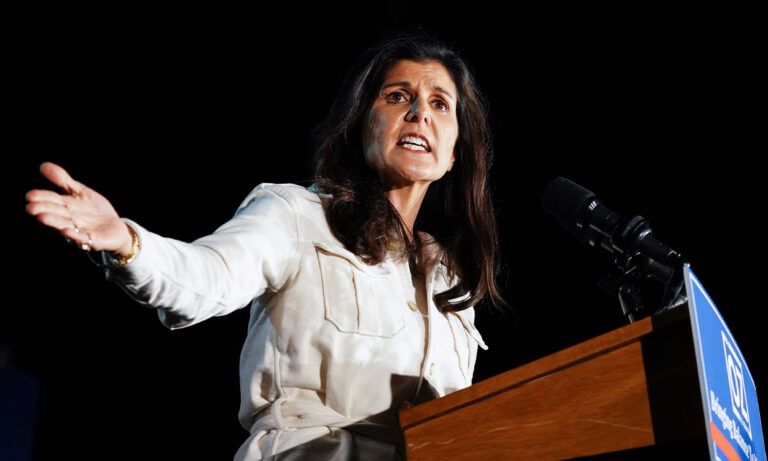Introducing Nikki Haley: the Republican challenging Donald Trump in the 2024 US Presidential race

For some of us, it feels as though it was only yesterday that Joe Biden defeated Donald Trump and officially—and legally— snatched the US Presidency out of his hands. But in reality, that highly momentous election was over three years ago and with 2024 only a hop, skip and jump away, we’re now being confronted with the next highly anticipated race to the White House.
And while former President Trump might be planning a political resurrection, he’s going to have to face a challenger who is determined to make her mark on the Republican party and on the country.
Who is Nikki Haley?
Although Haley has been a prominent voice in US politics for over a decade, she’s remained relatively unknown among the general public. First rising in the Republican ranks in 2010 when she became the youngest Governor in the US, Haley quickly established herself as a conservative underdog with plans to reinvent and rejuvenate the Grand Old Party (GOP).
According to the BBC, Haley—who was South Carolina’s first female and Asian-American Governor—had a slow start to her campaign, however, she gained traction when she received high-profile endorsements from Mitt Romney and former Governor of Alaska, Sarah Palin.
The politician is considered a mainstream conservative, holding predominantly right-wing fiscal and social beliefs. Haley has described herself as pro-life and has repeatedly supported legislation in South Carolina designed to curb access to abortion. Moreover, she signed a bill cracking down on illegal immigration in her first year as Governor and has since criticised President Biden’s border control policies. Haley has publicly confirmed that she supports—and would defend—gun rights.
As recognised by a number of political pundits, Haley’s most defining moment as Governor happened in 2015 when a white supremacist brutally murdered nine black worshippers in the historic Emanuel African Methodist Episcopal Church in Charleston.
The shooting was one of the most heinous and racist attacks in US history and its impact reverberated throughout the country—particularly in South Carolina, where conversations around race and identity began to increase rapidly.
Haley’s initial response was to immediately condemn the attack and, after pictures emerged of the gunman carrying the Confederate flag, she called for it to be removed from the Capitol building. In fact, during the passing of the motion to take it down, she stated: “There is a place for that flag. It’s not in a place that represents all people in South Carolina.”
The Confederate flag of course has become an enduring symbol of racism within the US, having been adopted by hate groups and white supremacists.
While Haley’s initial actions following the shooting was deemed commendable, it was ultimately short-lived. In 2019, while appearing on a conservative radio show, Haley stated that the Confederate flag symbolised “service, sacrifice and heritage” for some people in her state until the Charleston shooter “hijacked” it, as reported by The New York Times.
The politician went on to note that the national media had wanted to define the shooting on their own terms. “They wanted to make this about racism. They wanted to make it about gun control. They wanted to make it about the death penalty,” Haley argued.
Her statements received major backlash online, particularly from those who felt as though she’d completely contradicted her own celebrated move to remove the flag four years prior. Indeed, it doesn’t take an expert to see how insensitive and problematic it is to claim that the flag was a symbol of sacrifice prior to the shooting, when in reality it’s been a stark physical representation of oppression and racism for over a century.
What is Nikki Haley’s opinion on Donald Trump?
When it comes to Trump, Haley’s been both a proponent and critic. As reported by NBC News, when Trump first rose to power, Haley deemed him an “irresponsible” and “angry” voice, even going as far as to say that “I will not stop until we fight a man that chooses not to disavow the KKK. That is not a part of our party. That is not who we are.”
So, from this you’d think that Haley was very much anti-orange. However, not even a year into Trump’s administration, the South Carolina politician had definitely changed her tune. In November 2016, Haley accepted the position of ambassador to the United Nations. And at the 2020 Republican National Convention, the Governor stated: “Donald Trump has always put America first. And he has earned four more years as president.”
But wait, there’s another twist in the story. Following the 2021 Capitol riots, Haley was overwhelmingly critical of Trump and insisted that his actions and involvement with the violence would be “judged harshly by history,” as disclosed by Politico.
Trump is facing a far harsher political landscape going into the 2024 election cycle, and his chances are hard to quantify. He’s going to have to rebuild his image in the minds of both the Republican establishment and the conservative public. Although, as much as we’d like to, it would be unwise to underestimate the sheer influence of Trump—despite his endless list of flaws.
Will Haley become the new right-wing sweetheart? Or will she simply remain to be another one of the GOP’s misguided cronies, attempting to rid the world of what they like to call extreme liberal wokeism?





